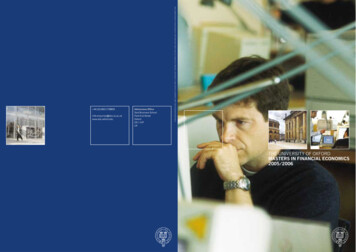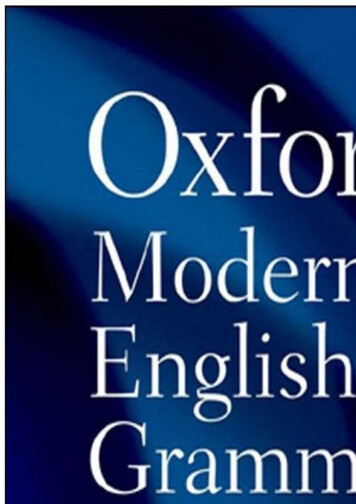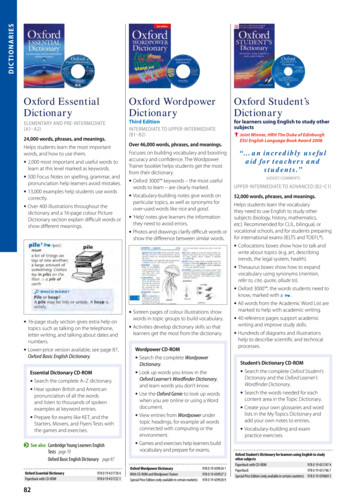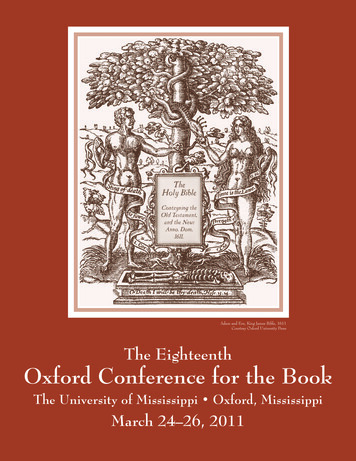
Transcription
ions OfficeSaïd Business SchoolPark End StreetOxfordOX1 1HPUK 2004 SAÏD BUSINESS SCHOOL. E&OE. DESIGNED AT WILSON HARVEY, LONDON [020 7798 2098]. PHOTOGRAPHY BY ROB JUDGES, GREG SMOLONSKI, KATERINA KANTALIS, DENNIS GILBERT/VIEW. 44 (0)1865 278809THE UNIVERSITY OF OXFORDMASTERS IN FINANCIAL ECONOMICS2005/2006
Do you want a career in:Investment bankingAsset managementOther financial institutionsFinancial marketsFinance divisions of companiesOr as a financial economist in:Consultancy, regulation, the publicsector or international agencies?Our course will uniquely equip youfor all these careers and others at thecutting edge of finance and economics.Explore how the Oxford MFE will give youa head-start in professional finance andfinance research.The Oxford Mastersin Financial EconomicsWhat you will find in the following pages:A new gateway to professional finance1IntroductionA new and exciting Oxford programme2Programme outlineLearn about the structure and content of our MFE course4Core coursesDevelop your understanding6ElectivesLearn about the specialist courses we offer8The applicantsWe expect our applicants to be exceptional10NetwokingHow you can use our global networks12Living in OxfordFind out about our ancient university and modern city14KnowledgeBe taught by the world’s leading finance faculty16CareersSee how we can help you plan your post MFE future18FacilitiesTake a look at our new business school20ApplyingRead the guidelines on how to apply and what we’re looking for22QuestionsAnswers to commonly asked questions
“Why financial economics? All theimportant ideas in finance – suchas how to measure and price risk,the importance of capital structure,option valuation, and estimating thecost of capital – derive from seminalwork in financial economics.”Tim JenkinsonIntroductionA new and exciting Oxford programmeThe Masters in Financial Economics(MFE) is a full-time nine-monthprogramme that will provide outstandingtraining in the tools of financial economicssought by financial institutions,companies and public organisations.We are seeking individuals withexceptional intellect and personalityto lead the next generation of managersin professional finance. You will havestrong quantitative skills, an abilityto absorb new ideas quickly, and awillingness to work hard. The classwill have a wide variety of professionalexperience and the application processlooks for evidence of commercialunderstanding and a developedinterest in business.The MFE is run jointly by theUniversity’s business school andeconomics faculty. The Finance Facultyat the Saïd Business School is one ofthe fastest growing and most prestigiousin Europe. The Oxford UniversityDepartment of Economics is hometo one of the most diverse and wellknown groups of economists in theworld. Together they publish prolificallyin top journals, speak at academicand practitioner conferences, andadvise companies, financial institutionsand governments.As a student at Oxford Universityyou will be entitled to full use of thefacilities of the 800 year-old institution,including the state-of-the-art SaïdBusiness School. As a graduate ofOxford you will be part of one of thelargest and most respected groupsof alumni in the world.This course offers uniquecombinations: Intellectual rigour of a graduateprogramme with the delivery ofa business school. Thorough grounding in economicswith practical applications to finance. Quantitative training in financewith sound theoretical principles. Global alumni network anda first-rate career service. Collegiate structure with oneof the world’s great universities. State-of-the-art business schoolwithin an ancient university.1
Through courses in finance,microeconomics, and econometricsyou will gain a thorough grounding inthe study of financial economics. Inaddition to the core courses you willbe able to develop your own specialistknowledge and map out a future careerthrough your choice of elective courses.Courses are all structured tolook at both the theoretical underpinningsof a subject and their practical application.In the Oxford Masters in FinancialEconomics we have created a coursefundamentally concerned with a detailedexamination of the foundations ofbusiness in a manner which impartslong-lived and valuable knowledge.Using the MFE as a gatewayto Financial ResearchFor those interested in pursuing doctoralresearch in financial economics, it ispossible to use the MFE courseworkas preparation. There are excellentdoctoral facilities in finance in Oxfordin the Business School, Economicsand Maths Departments. Please goto the Oxford Financial Research Centrewebsite (www.finance.oxford.ac.uk)for more information.Prospective doctoral students willbe required to write a research-orientedproject report in the third term andwill also be required to take certainadvanced electives. Admittance to adoctoral programme is then subjectto excellent performance on the MFE,possibly some additional coursework,the development of a promising researchprogramme, and the identification ofan appropriate supervisor.Programme outlineWhat will you learn from us?Your nine months will be structured as follows23
All students take the core coursesin corporate finance, asset pricing,financial econometrics andmicroeconomics. These corecourses are all carefully integrated:the economics and econometrics coursesapply theories and methodologiesto finance, and the finance coursesprovide the underlying economicprinciples of financial practice.These courses extend over the firsttwo terms and do not assume priorknowledge of finance or economics.However, once accepted you will beprovided with pre-course reading soshould you lack a background in financeor economics you can become familiarwith key concepts and techniques thatwill be introduced early on in the course.During the first term there will alsobe optional mathematics classesshould you need additional practiceand support.In addition to the examined courses,there are seminar series involving leadingpractitioners from the finance andeconomics sectors.Core coursesAsset PricingThe asset-pricing coursecovers the theory and practiceof valuing claims to uncertaincash flows; for example stocksand stock options, bonds andforeign-exchange instruments.The course covers standardmaterial such as CAPM andthe Black-Scholes formula, andsome advanced material such asconsumption-CAPM and pricingformulas for ‘exotic options’.About half of the course isdedicated to the applicationof advanced statistical methodsto the area of asset pricingand to practical work withreal-world data.4Corporate FinanceCorporate finance is the studyof the financing, valuation andcorporate governance of firms.During this course you willlearn the fundamental principlesof financial accounting, thevaluation of firms’ assets and thedeterminants of firms’ financialstructure. You will be taught thekey components of firms’ financialdecisions and the operation offinancial markets, including newissues of securities, debt anddividend policy. You will learn aboutthe relevance of different financialinstitutions to the financingof firms, the takeover process,corporate restructurings andfinancial distress.Financial EconometricsThe course in financialeconometrics provides studentswith a background in thefundamentals of empiricalmodelling and testing in finance.This will allow them to betterunderstand crucial concepts likerisk, evidence and prediction.MicroeconomicsMicroeconomics is the studyof how financial and commercialframeworks and conditionsimpact on individual situationsand business units. During thiscourse you will learn to apply thebasic tools of market and firmanalysis, game theory, incentivetheory and auctions.For complete rubrics visitthe website atwww.sbs.oxford.edu/mfe5
How are coursesassessed?The wide range of electives enables youto gain a deeper knowledge of areas ofspecial interest by choosing five coursesfrom those on offer.Electives anticipated for the 2005–6course include:Courses are assessed using acombination of examinations andassignments. Courses vary in the waythey are assessed, with core coursesplacing the emphasis on examinations,and electives stressing writtenassignments, some of which maybe undertaken in teams. Althoughclassroom participation is not graded,many courses give credit for the casestudy write-ups that form the basisfor classroom discussions.During the nine months you arerequired to produce a project report,based upon material covered in thecore courses. This allows you to conductresearch into an area or applicationof particular interest which must bewritten up during your third term.Applied Corporate FinanceCapital RaisingCompetition PolicyContinuous Time FinanceCorporate Governance and TakeoversDerivativesFixed IncomeHedge FundsIndustrial EconomicsInternational Financial MarketsMathematical Finance“I chose mainly financial electives of which theemerging capital markets and the course onprivate equity were particularly good. I thinkthose two courses alone made it worthwhilecoming to Oxford.” Stefan Bisse, GermanyMergers and AcquisitionsPrivate EquityRegulationTrading and Market MicrostructureValuationPlease note that the elective coursesoffered are subject to change.ElectivesCase studyThe Private Equity electiveCo-taught by Dr. Tim Jenkinson ofSaïd Business School and HumphreyBattcock, a director of AdventInternational, the private equity courseopens up one of the more complex areasof financial management. Private equityinvestments are illiquid and hard to valueand those who manage them oftenbecome engaged in the decision makingof the companies involved, all of whichmakes practical skills as importantas theoretical knowledge.Assessed through four case studies, twospreadsheet assignments and a grouppresentation the course demands thatstudents constantly apply the materialthey have been presented.6Tim Jenkinson says:“Practical relevance is hard-wired intothe course. Many management coursestry to inject relevance by drafting ina battery of practitioners as guestspeakers, but the results are often patchyand uncoordinated. We wanted tointegrate practice from the word go.”Case studyThe Fixed Income and Derivatives electiveThe Fixed Income and Derivativeselective consists of two parts: the firstdeals with the instruments of financeand debt markets, the second part withderivatives. The idea of the elective is tocombine classical finance theory andasset pricing as relating to debt, fixedincome instruments, mortgages andbonds, in terms of the structural theoriesbehind them. To see how these highlyspecialised, highly technical topics areapplied in the real world, Dr. DimitriosTsomocos co-teaches the course withDr. Manos Menardos of JP Morgan.Theoretical sessions alternate withpractical ones where students applythe theoretical constructs and analyticaltools they learn. Another, very important,part of the elective is the emphasison the limitations and the underlyingeconomic principles of fixed incomeand derivatives pricing. For example,what happens when asset markets areincomplete? And how can the modeltechniques for fixed income andderivatives be used for risk management,crisis prevention and price management?The elective also touches upon somemicroeconomic consequences of riskmanagement where the issue of financialstability emerges.7
The applicantsWho should apply?We are looking for applicants fromall over the world and from all kindsof backgrounds. We anticipate thatthe class will be global in origin, withwork experience gained in finance andelsewhere. The one essential requirementfor a candidate is a desire to understandthe theory of finance and to apply itin practice.If you are planning a career in financeor financial research then the Mastersin Financial Economics is for you. If youare already in work but feel that a formaltraining in Financial Economics wouldaid your career then the MFE is just thecourse you are looking for. If you are anemployer in need of a financially skilledworkforce then the MFE is the long-termtraining tool you need.In assessing our applicants we willlook for evidence that you Have made an informed decision tostudy finance and are highly motivated. Are able to cope with complexquantitative tasks and numericalanalyses. Will actively contribute to a classof diverse backgrounds, nationalitiesand outlooks. Have a proven capacity for hard workand a desire to achieve great things. Have a track record of academicachievement at degree level. Have the maturity to cope with aprofessional learning environment,although prior work experienceis not essential.8We do not assume prior knowledgeof economics or finance but you willbe joining a group of highly motivatedand capable individuals, many with abackground in these areas, and all witha strong ability to think conceptuallyand analytically.There is no formal mathematicsrequirement for the course, but youwill be expected to apply basic mathstechniques – such as functions, limits,calculus, probability and unconstrainedoptimisation – early on in the course,and to acquire statistical skills rapidlyduring the course. Pre-course readingwill provide a precise indication of thestandard of maths that will be expected,and allow motivated and talentedstudents to reach this level. Mathsclasses will also be provided at thebeginning of the course to provideassistance to those who require it.The Masters in FinancialEconomics is a tough and demandingcourse which offers significantprofessional or academic rewards tosuccessful candidates. We expect ourapplicants to be exceptional and judgethem accordingly.9
Alumni networksFor centuries, the University ofOxford has produced some of themost influential and respected peoplein business. Oxford Graduates arerepresented in every Fortune 500company, country and governmentin the world.The Oxford Business Alumni (OBA)was established in 1998 and exists toprovide a focus for Oxonians who have aspecial interest in the world of business.There are currently 23 regional groups(or Chapters) of the OBA, spanningevery continent across the world.As a member of the Oxford BusinessAlumni, participants are entitled toaccess the alumni search directory,an invaluable tool for networking withorganisations throughout the world aswell as attend regular seminars, lecturesand other networking events, givingcurrent participants and alumni thechance to meet, exchange ideas andget to know each other.We encourage participants to takean active role on the Advisory Boardduring their time at the School andfurther information can be found onthe OBA website (www.oba.co.uk).NetworkingWho will you talk to?By attending the Saïd Business School,you gain exposure to the top ranks of thebusiness world. Regular seminars andguest lectures provide a steady stream ofnetworking and business opportunities.10The Oxford Business ForumThe Oxford Business Forum is an annualevent organised by students to bring thebiggest names of the business worldto the Saïd Business School. Previousattendees have included Liu Chuanzhi,Asian Businessman of the Year; GeorgeMallinckrodt, President of Schrodersand Ruben Vardinian, Founder and CEOof Troika Dialog – the largest investmentbank in Eastern Europe.The Amadeus DistinguishedSpeaker seriesThe Amadeus Distinguished Speakerseries provides a further opportunityfor you to meet with leaders in businesson an open and informal basis. Previousspeakers have included Sam Laidlaw,CEO of Neptune Oil & Gas; HectorSants, CEO Europe of CSFB; RichardGreenhalgh, Chairman of Unilever;Roland Berger, Founder of Roland Berger& Co and Dame Stephanie Shirley,Founder of the FI Group.The Dean’s Seminar seriesThe Dean’s Seminar series is sectorfocused. Previous speakers include,Erik Vollebregt, CEO – Shell technologyVentures (Energy and Utilities sector);Simon Cornwell, Amadeus CapitalPartners and Isaac Olasoko, CEO ofTransmode (Venture Capital/PrivateEquity sector) and Will Wyatt, formerMD of the BBC (Media sector).The Skoll World Forum onSocial EntrepreneurshipThe Skoll World Forum on SocialEntrepreneurship aims to generatea new strategic agenda for socialentrepreneurship by bringing togetherthe leading thinkers and practitionersin the field from around the world. Heldannually, this event aims to advanceand frame a debate that will help build acoherent and useful body of knowledgearound social entrepreneurship thatcan contribute to the advancementof systemic change, benefitingcommunities all over the world.All members of the Business Schoolare invited to attend.Silicon Valley Comes to OxfordOnce a year the Saïd Business Schoolinvites technology business leaders tocome to Oxford and take part in masterclasses and panel discussions on variousareas of the technology sector. Thesemaster classes and panel discussionsgive valuable insight into up and comingtechnologies as well as networkingopportunities with key members of theSilicon Valley business community.Previous guests include Max Levchin,Chief Technical Officer at PayPal;Raymond Nasr, Director of ExecutiveCommunications, Google Inc; Jeff Skoll,Co-Founder and President, Ebay and BobWeinschenk, President and CEO ofPixim, Inc11
Oxford is one of the world’s mostbeautiful cities. Living in Oxford for ayear will be an unforgettable experience.Oxford is home to over 1600 start-upbusinesses and some of the mostadvanced research labs in the world,but remains best known for its medievalcolleges and their dreaming spires.Today Oxford is where it always has been;at the forefront of modern knowledge.How will you live?Living in Oxford“I think what makes this business schoolunique is the fact that you belong to thebusiness school but you also belong toa college and between the two there isalways something social going on orsomething business related, so I thinkit offers a very all-round experience.”Daniel Bergheim, GermanyLiving in Oxford gives you access tosome of the world’s most beautifularchitecture and one of the UK’s mostmodern cities. Beyond the universityOxford has some of the best pubs andrestaurants in Britain and is well stockedwith cinemas, theatres and venues for allkinds of live music. Public transport isplentiful, although many students findOxford’s lack of hills makes bicycle theideal way to travel. Others simply chooseto walk about the compact city centre.Students and their families have littletrouble finding ways to pass their time inOxford. A population of 30 000 studentsmeans there is lots of nightlife, andsocieties exist for everything fromarchery to caving, medieval music,painting and snowboarding. Familiescan occupy themselves in the manymuseums and art galleries, or chooseto explore the beautiful Oxfordshirecountryside.Located in the centre of EnglandOxford is ideal for students wishing toexplore the UK during their time here,and is only an hour from London andinternational airports by train or bus.“The opportunity of putting yourchild into the education system inOxford is such a unique and rewardingexperience. You can’t get this anywhereelse. I am very happy I have Alex herewith me. I have seen him changeso much.” Clara Deak, RomaniaFacilities for familiesA number of students bring theirfamilies to Oxford each year and theSchool is delighted to welcome spousesor partners, and children. Early inthe year, students’ partners and theirchildren establish a community and formnew friendships. Families join studentsin the School on a daily basis for lunchand at the end of a day of lectures.They also meet socially outside thelife of the School and many will remainfriends after their studies are finished.Students enjoy a wide range of socialevents in the School to which familiesare warmly welcomed.The School appreciates that movinga family from home, often from anothercountry, is a demanding task and onethat requires considerable planning.We are committed to do what we canto make this as straight forward aspossible. Each student will have theirown individual requirements and thestaff of the Admissions Office willprovide as much help and informationas possible to meet these. We canprovide information and advise on anumber of important matters includinghousing, doctors, hospitals, healthinsurance, nurseries and schools.If you have any questions aboutbringing your family to Oxford foryour MFE year please contact us on 44 (0)1865 278809 or by email atmfe-enquiries@sbs.ox.ac.uk12CollegesOxford University is composed of overthirty separate colleges and each studentmust belong to one. Colleges provideaccommodation, food and mostimportantly community. While you maynot choose to actually live within yourcollege they can still help with findingrooms and offering a great place to eat.For those who do choose to ‘live in’facilities are normally excellent, althoughgraduate accommodation (as used byMFE’s) is often located away from themain college building in convertedhouses or purpose built annexes.Once a student has been admittedby the Business School they mustchoose a college. While the BusinessSchool cannot guarantee that you willbe accepted by your first choice collegewe do guarantee to find a place foreveryone we accept.While all the colleges have differentpersonalities and most students willtell you that theirs is superior, actualdifferences are limited. Key things tobe aware of are the difference betweengraduate colleges which only takepostgraduate students (including MFE’s)and the majority of colleges which alsoadmit undergraduates. A handful ofcolleges are restricted to members ofmonastic orders (St Benets, CampionHall and Blackfriars) and one, St Hildas,is women only. A full list of the colleges,links to their individual websites anda more detailed explanation of theuniversity’s structure is available athttp://www.ox.ac.uk/collegesAs a source of generalinformation thefollowing web pagesfrom the Universityand other websitesmay help.www.sbs.oxford.edu/mba y.co.uk/oxford/homeaccommodation13
The Finance Faculty at the Saïd BusinessSchool is one of the fastest growing andmost prestigious in Europe. The OxfordUniversity Department of Economicsis home to one of the most diverseand well-known groups of economistsin the world. As a group they areextremely active in publishing in topjournals, speaking at academic andpractitioner conferences, and in advisingcompanies, financial institutions andgovernment bodies.Our research targets the intersectionbetween knowledge and practice andwe will equip graduates in financialtechniques as well as the economicprinciples behind them. The connectionbetween these is now more crucialthan ever.Our faculty provide intellectualleadership for institutions like theEuropean Corporate GovernanceInstitute. This leadership emergesfrom our in-depth knowledge in a widevariety of research areas, includingIPOs, corporate governance and theregulation of financial institutions.The MFE exposes students both tothe specialist teaching with the BusinessSchool and Economics faculty andalso to the wider intellectual communitywithin the University. Additionalfaculty may be drawn from the otherdepartments of the university, includingStatistics and Mathematics. In addition,Oxford University offers a constantlychanging programme of lectures oneverything from Intellectual Propertyto Quantum Physics, many of whichare hosted by the Business School.“Take hedge fund managers: a knowledgeof instruments and markets is notenough. Statistical arbitrageurs needeconometrics, while risk arbitrageursmust understand game theory. Theidea is that our graduates will notonly have a competitive advantage;they will be one.” Howard JonesFor a complete listing of facultyand further information about theirwork, please go to our website atwww.sbs.oxford.eduWhat are we thinking about?KnowledgeDimitrios TsomocosDimitrios is from Greece,completed his PhD at Yale andteaches the Derivatives course.Besides being an advisor to theBank of England he researchesbanking and regulation, incompleteasset markets, systemic risk,financial instability and issuesof new financial architecture.“Even though we cannot predict thestormy seas of financial prices, thepurpose is to teach you how to sailand navigate in these volatileenvironments.”14Colin MayerColin was educated at Oxfordand Harvard. He specialises incorporate finance and researcheson financial systems in differentcountries, corporate governanceand the regulation of firms andfinancialinstitutions. With thecorporate scandals of the last fewyears there has been much interestin policies to improve corporategovernance. Colin Mayer has beenactively engaged in both academicand policy related research on thistopic. Some of his recent researchhas been particularly influentialin the development of corporategovernance reform in Europe. Heis a regular advisor to companies,financial institutions andgovernments and successfullybuilt up one of the UK’s largesteconomic consultancy firms.He runs the Oxford FinancialResearch Centre that bringstogether researchers in financeacross the University as a whole.For a complete listing of faculty and further information about their work, please go to our website at www.sbs.oxford.eduNeil ShephardNeil received his PhD from LSEwhere he was a lecturer from1988 to 1993. He has been anOfficial Fellow at Nuffield College,Oxford since 1993, becomingalso a Professor of Economicsat Oxford University in 1999. Heis a specialist in econometrics,particularly financial econometrics.He has published around 40papers in the last 10 years inleading academic journals,including all the main ones inhis field. As well as being on theeditorial boards of Econometricaand The Review of EconomicStudies, he is a Director of TheReview of Economic StudiesLimited and a start-up firm Rosroewhich advises investment houseson the use of market microstructureeconometrics to reduce tradingcosts. Neil is currently researchingon the use of high frequencyfinancial data to improve volatilitymeasurement and jump detection.Tim JenkinsonTim was educated at CambridgeUniversity, the University ofPennsylvania and Oxford. Hecurrently researches on initialpublic offerings and teaches thepopular Private Equity elective.Along with Business School facultymember Colin Mayer he is adirector of the leading economicconsulting company OXERA.“Research on how to raise equityfinance, the role of investmentbanks, and the significant conflictsof interest, has become extremelyactive in recent years, partly as aresult of the scandals uncovered inthe U.S. My research has a strongpolicy focus, and questions some ofthe techniques currently employedto price and allocate IPOs.”Alan MorrisonAlan Morrison studied mathematicsat Oxford before working in the Cityfor six years as a derivatives trader.He then took a Masters’ degree inComputer Science at ImperialCollege before returning to Oxfordwhere he wrote a DPhil on financialeconomics. His research is mostlyon the regulation of financialinstitutions and on the investmentbanking industry.“I am interested in the applicationof techniques from contract theoryto financial questions. My currentwork concentrates on two areas:firstly upon the regulation of banks,insurance companies, and financialconglomerates; and secondly, uponthe governance and industrialorganisation of the investmentbanking industry.”15
While we expect our graduates to facedemanding expectations and toughcompetition in the job market, ourcareers service aims to equip you to winthose competitions. We will provide youwith the skills and knowledge to competeat the highest level, whether you’relooking to change your career, enterthe world of finance for the first timeor to advance within your chosen area.Career skills trainingTeaching you to sell yourself, how tocompete and how to win the top jobs youwant is the goal of our careers service.Over the course of a year we will aimto provide you with interview training,develop your networking skills, teach youto produce the perfect CV and see thatyou are prepared for anything the jobmarket can throw at you.Sector consultantsThe world of professional finance iscomplex, and to ensure our graduatesare able to find and secure the rightopportunities we have developed a panelof Financial Sector Consultants who canbring extensive experience and contactsto your search for the perfect job.Recruitment fairsIn addition to the fairs held by theUniversity each year, in May 2004the School hosted the first ever jointventure recruitment fair with the JudgeInstitute of Management, Universityof Cambridge. The fair, attended byseventeen companies from diversesectors and two hundred and fiftystudents, was hailed as a greatsuccess by recruiters.Industry panel discussionsDuring term we invite representativesof a chosen industry to present at theschool. Speakers are asked to describethe dynamics that affect their chosensector, the job opportunities and the keyrequirements for winning jobs. Whilethese events cover many areas as wellas finance they are a great chance tofamiliarise yourself with the dynamicsof industries throughout the economy.Attendees come from companiesranging from blue chip leaders to localstart ups as we aim to highlight theopportunities that exist right acrossa given sector.“Success is 80% hard work, startingwith the right education.” Roland Berger,CEO Roland Berger Strategy ConsultantsCareersWhat can we help you do next?ProfileROGER HOWGEGOSector Consultant forInvestment Banking16Roger started his City career in 1973at Orion Bank, a major innovator in theEurobond Market. In 1980, he joinedMorgan Grenfell to develop theinstitutional sales of fixed incomeproducts and subsequently joinedLehman Brothers to expand theirdistribution of European Governmentproducts on a Global basis. In 1995 hewas appointed Head of Fixed IncomeResearch (Europe) and was promotedto Managing Director the following year.In 1998 he took on the newly createdrole of Head of Campus Recruitmentfor Europe at Lehman.
THE UNIVERSITY OF OXFORD MASTERS IN FINANCIAL ECONOMICS 2005/2006 Admissions Office Saïd Business School Park End Street Oxford OX1 1HP UK 44 (0)1865 278809 . website (www.finance.oxford.ac.uk) for more information. Prospective doctoral students will be required to write a research-oriented










